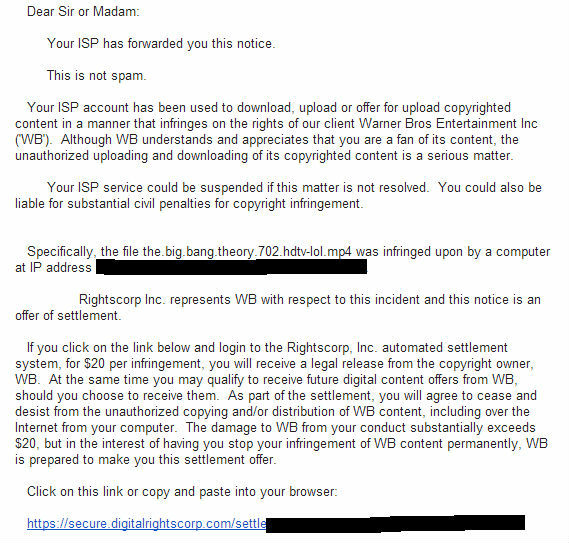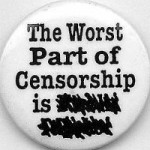RIAA Rogue Site Report Reveals Major Site Blocking in 48 Hours
lundi 28 octobre 2013 à 20:06 Responding to a request from the Office of the US Trade Representative (USTR), on Friday the MPAA submitted a new list of so-called “notorious markets.”
Responding to a request from the Office of the US Trade Representative (USTR), on Friday the MPAA submitted a new list of so-called “notorious markets.”
The MPAA’s report listed many of the usual suspects such as The Pirate Bay, KickassTorrents, ExtraTorrent and Torrentz, plus a selection of file-hosting sites such as Netload, ExtaBit and PutLocker.
A little while ago TorrentFreak obtained a copy of the RIAA’s submission and aside from doubling up on some of the same sites listed by the MPAA, it also delivers a surprise.
Torrent site blocking imminent
The RIAA says that in just 48 hours time a new wave of site blocking will take place in the UK covering not only the usual BitTorrent indexes, but also dedicated search engines in the torrent and file-hosting space.
On October 30, ExtraTorrent will be blocked by the UK’s leading ISPs, presumably following action by the major labels of the BPI. ExtraTorrent has suffered at least two anti-piracy setbacks in the last week, first when City of London Police convinced its registrar to take its domain and second when Google removed the site’s homepage from its search results.
The second indexing site to be blocked on Wednesday will be BitSnoop, which earlier this year was the eighth most-popular torrent site in the world. The RIAA says that since the site provided no way for rightsholders to make contact the decision was made to have ISPs block the site instead.
The third site to be rendered inaccessible this week will be Torrentz.eu. What is unusual about this development is that Torrentz is a so-called meta-search engine, in that it carries no torrents of its own but searches other torrent sites instead. Nevertheless, the site still complies with DMCA takedown notices, a fact acknowledged by the RIAA.
“[Torrentz] is currently hosted by Canadian providers. The site complies with take down notices by removing the torrents identified in those notices which provide access to infringing files. The site can take up to several days to remove infringing files following a request by right holders,” the RIAA explain.
In the rest of the USTR submission on torrent sites the RIAA lists many of the usual suspects, including The Pirate Bay, KickassTorrents, Torrenthound.com, Fenopy.se, Monova.org, Torrentreactor.net and Sumotorrent.sx. Many of these sites are blocked around Europe already.
As usual, two resilient trackers from Bulgaria – Arenabg and Zamunda – also get a mention.
Cyberlockers and related search engines
While there are plenty of file-hosting sites to choose from that could certainly be considered rogue (refusing to take down content etc) it’s again somewhat of a surprise that this week a copyright-compliant site will become blocked at the ISP level.
FilesTube is the most popular search engine for file-hosting sites and as such has been absolutely hammered by rightsholders looking for links to be taken down. It is by far the most targeted domain in Google’s Transparency Report with 9,242,032 URLs removed, double its closest ‘competitor’.
Interestingly the RIAA admits in its report that Filestube does respond to takedown notices. However, the industry can’t keep up so the implication is that this is FileTube’s fault.
“Industry reports links to infringing materials to the site operator, but any action by the operator is ineffective as the speed of the takedowns cannot match the speed at which new links are added,” the RIAA writes.
Along with the sites listed above, FilesTube will be blocked by the UK’s top six ISPs on Wednesday.
Other hosting sites singled out for detailed criticism by the RIAA include Uploaded.net, 4Shared.com, ZippyShare.com, Rapidgator.net, TurboBit.net and a selection of lesser known sites located in the Czech Republic. Three other sites are mentioned in passing – FreakShare.com, BitShare.com and Extabit.com.
“We greatly welcome this initiative designed to expose businesses who operate notorious markets for infringing materials, and who generally either directly profit from the sale or other distribution of infringing materials, or who profit from facilitating such theft—in many cases through the sale of advertising space,” the RIAA writes.
“Quite simply, there is no place for open and notorious theft in a civilized world, regardless of how that theft is accomplished. Addressing the conduct of these notorious markets for piracy will go a long way towards promoting the rule of law, fuelling creativity and innovation, and maintaining US economic competitiveness,” the industry group concludes.
Meanwhile, every single site listed in the notorious market reports of both the RIAA and MPAA remain 100% accessible from all of the ISPs in the United States.
Source: RIAA Rogue Site Report Reveals Major Site Blocking in 48 Hours
 For years the entertainment industries have been complaining that online piracy is hurting their revenues.
For years the entertainment industries have been complaining that online piracy is hurting their revenues. 


 This week we have two newcomers in our chart.
This week we have two newcomers in our chart.  It has been said, that nobody is as hard to convince of a fact as those whose paycheck depend on not understanding it.
It has been said, that nobody is as hard to convince of a fact as those whose paycheck depend on not understanding it. 